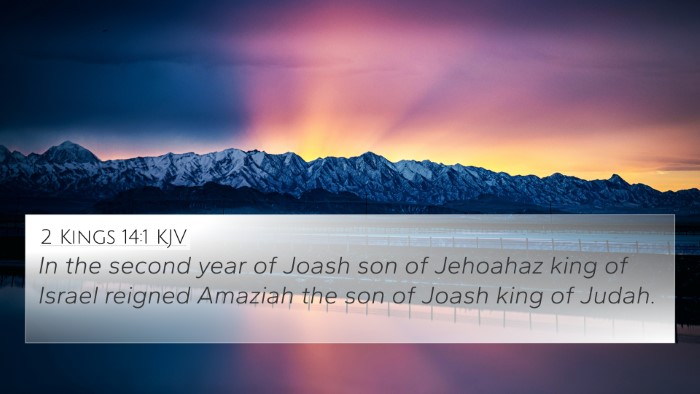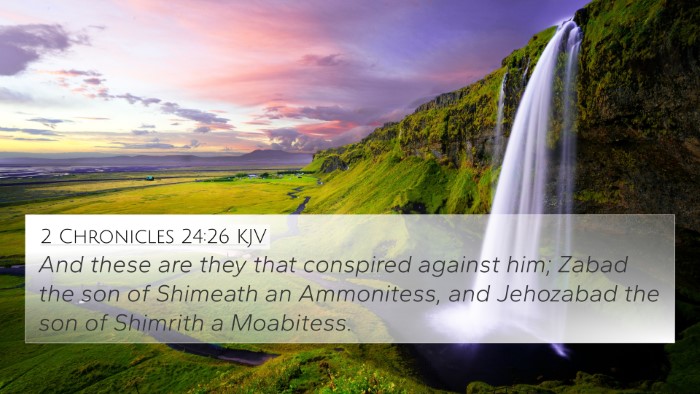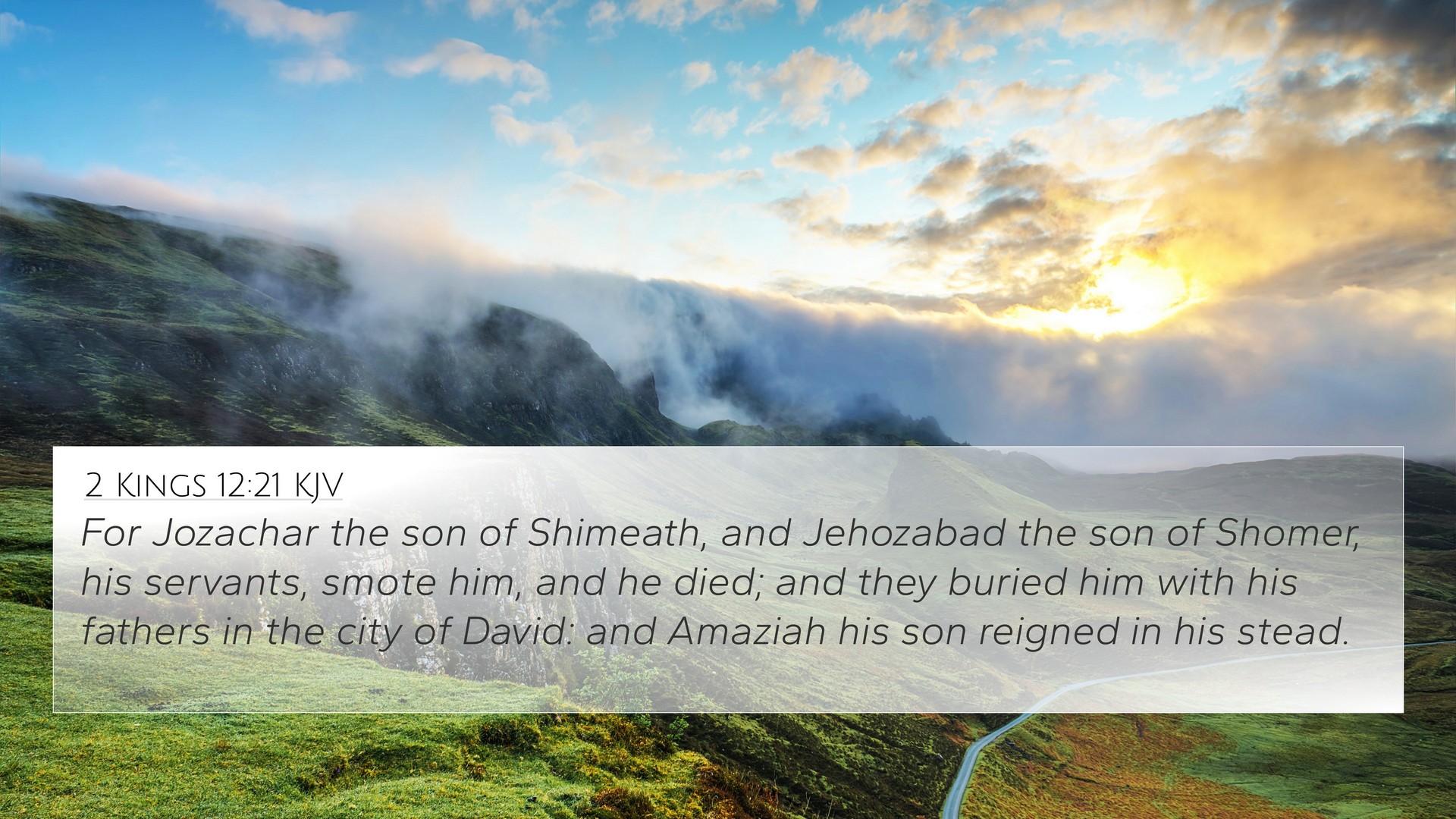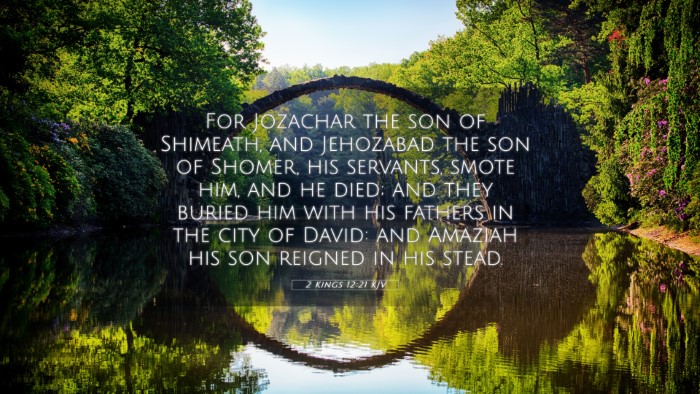Old Testament
Genesis Exodus Leviticus Numbers Deuteronomy Joshua Judges Ruth 1 Samuel 2 Samuel 1 Kings 2 Kings 1 Chronicles 2 Chronicles Ezra Nehemiah Esther Job Psalms Proverbs Ecclesiastes Song of Solomon Isaiah Jeremiah Lamentations Ezekiel Daniel Hosea Joel Amos Obadiah Jonah Micah Nahum Habakkuk Zephaniah Haggai Zechariah Malachi2 Kings 12:21 Similar Verses
2 Kings 12:21 Cross References
For Jozachar the son of Shimeath, and Jehozabad the son of Shomer, his servants, smote him, and he died; and they buried him with his fathers in the city of David: and Amaziah his son reigned in his stead.
Uncover the Rich Themes and Topics of This Bible Verse
Listed below are the Bible themes associated with 2 Kings 12:21. We invite you to explore each theme to gain deeper insights into the Scriptures.
2 Kings 12:21 Cross Reference Verses
This section features a detailed cross-reference designed to enrich your understanding of the Scriptures. Below, you will find carefully selected verses that echo the themes and teachings related to 2 Kings 12:21 KJV. Click on any image to explore detailed analyses of related Bible verses and uncover deeper theological insights.

2 Kings 14:1 (KJV) »
In the second year of Joash son of Jehoahaz king of Israel reigned Amaziah the son of Joash king of Judah.

2 Chronicles 24:26 (KJV) »
And these are they that conspired against him; Zabad the son of Shimeath an Ammonitess, and Jehozabad the son of Shimrith a Moabitess.
2 Kings 12:21 Verse Analysis and Similar Verses
Understanding 2 Kings 12:21
The verse 2 Kings 12:21 states, "For Jozachar the son of Shimeath and Jehozabad the son of Shomer, his servants, smote him; and he died; and they buried him with his fathers in the city of David: and Amaziah his son reigned in his stead." This passage encapsulates the end of King Jehoash’s reign, highlighting themes of power, betrayal, and divine judgment.
Historical Context
To properly appreciate this verse, it is essential to grasp the historical context. Jehoash, or Joash, became king of Judah and reigned for 40 years, during which he attempted to restore the worship of Yahweh. However, his reign was eventually marred by idolatry, and his own officials turned against him.
- Background of Jehoash: Jehoash began his reign under the guidance of the priest Jehoiada but strayed from God later, leading to his demise.
- Political Environment: The brief and violent coup emphasizes the instability of the monarchy during this period.
Commentary Insights
Insights drawn from various public domain commentaries shed light on the complexities of this passage:
- Matthew Henry: He emphasizes the divine judgment that culminates in Jehoash's assassination, asserting that God’s anger against the sins of Jehoash led to his downfall.
- Albert Barnes: Barnes notes that the actions of the servants who killed Jehoash were driven by political motivations and reflect the treachery in the courts of the kings of Judah.
- Adam Clarke: Clarke discusses the burial of Jehoash and contrasts it with the fates of other kings, stressing the significance of lineage and rightful succession through Amaziah.
Thematic Connections
This verse highlights several key theological themes:
- Leadership and Accountability: Jehoash’s descent into idolatry demonstrates the consequences of failing to uphold faithfulness to God.
- Betrayal: The act of assassination by his servants underscores the theme of betrayal that permeates royal courts in scripture.
- Divine Authority: The transition of kingship to Amaziah illustrates God’s sovereignty over human affairs.
Cross-Referencing Related Scriptures
To deepen understanding, consider these cross-references that resonate with the themes in 2 Kings 12:21:
- 2 Kings 11:4-12: The account of Athaliah’s usurpation and her subsequent downfall highlights the treachery within the royal lineage.
- 2 Kings 13:1-9: Jehoash, the son of Jehoahaz, brings an interesting parallel in the consequences of idolatry and divine favor in royalty.
- 1 Chronicles 24:27: Discusses the role of Jehoiada in the religious reforms, contrasting with Jehoash’s latter failings.
- Acts 12:1-3: Parallel of political assassination and the consequences of kingship in the New Testament context.
- Matthew 24:9: Jesus warns of betrayal among leaders, echoing the treachery seen with Jehoash’s servants.
- 1 Kings 16:16: Connects to the theme of struggling kingships and their unstable reigns.
- Psalm 146:3: A reminder to trust in God rather than princes, reflecting the fate of trusting in worldly powers.
Practical Application
This passage serves as a critical reminder of several life lessons for believers today:
- Faithfulness: A commitment to God throughout one's life is essential to avoid the pitfalls seen in Jehoash's later years.
- Awareness of Betrayal: Be cautious of alliances and the motives of those around you.
- Divine Justice: Recognize that God's judgment on leaders extends beyond their reign and serves as a lesson for all.
Conclusion
In conclusion, 2 Kings 12:21 is a vivid illustration of the tragic fall of a king who once had great potential. By combining insights from various commentaries and cross-referencing related scriptures, we gain a fuller understanding of the vital spiritual principles at play. It invites deeper meditation on the importance of faithfulness, the dangers of political ambition, and the overarching sovereignty of God in the narratives of human governance.


